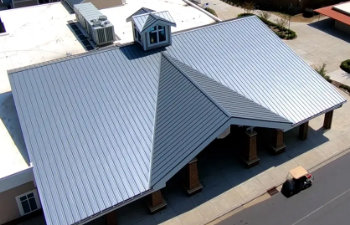
In recent years, the trend of using metal roofs for commercial buildings has gained significant traction among property owners and developers. With a variety of materials available, the choice of roofing can have a considerable impact on a building’s longevity, energy efficiency and maintenance costs. But are metal roofs truly a better option for commercial properties and Federal/Government projects? Metal Roofing Systems explores the key benefits and considerations.
Durability and Longevity
One of the most significant advantages of metal roofing is its unparalleled durability. Metal roofs can withstand extreme weather conditions, including heavy rain, snow, high winds and hail. Unlike traditional roofing materials, which may warp or degrade over time, metal roofs can last 40 years or more with proper maintenance. This longevity translates into reduced replacement costs and lower overall lifecycle expenses.
Energy Efficiency
Metal roofs reflect solar radiant heat instead of absorbing it, which can significantly reduce air conditioning costs in warm climates. Many metal roofing systems are coated with reflective pigments to enhance energy efficiency, thereby contributing to lower energy consumption and improved thermal performance. Additionally, metal roofs can be installed with insulation systems to further enhance their energy-saving capabilities.
Environmental Impact
As sustainability becomes a more pressing concern for many businesses, metal roofing offers eco-friendly options. Many metal roofs are made from recycled materials and are themselves 100% recyclable at the end of their lifecycle. This helps reduce landfill waste and promotes a circular economy. Moreover, the energy efficiency of metal roofs can help reduce a building’s carbon footprint.
Low Maintenance Requirements
Compared to traditional roofing materials, metal roofs require significantly less maintenance. Unlike asphalt shingles or wood, which may need regular inspections and repairs, metal roofs are resistant to rot, rust and insect damage. Routine maintenance primarily involves periodic inspections and cleaning, making them a practical choice for commercial property owners who prefer to minimize upkeep efforts.
Installation Flexibility
Metal roofs can be installed over existing roofs, making the installation process quicker and less labor-intensive. This can also help reduce waste and labor costs associated with removing old roofing materials. Additionally, metal roofing systems come in a variety of styles and colors, allowing property owners to choose options that align with their building’s aesthetic.
Cost Considerations
While the upfront cost of metal roofing can be higher than that of traditional materials, the long-term benefits often outweigh this initial investment. The longevity, reduced maintenance and energy efficiency can result in significant savings over time. Moreover, many insurance companies offer premium discounts for buildings with metal roofs due to their durability and resistance to damage.
Noise Concerns
A common concern about metal roofing is noise during rain or hailstorms. However, this can be mitigated through proper insulation and underlayment installation. Modern metal roofs can be designed to minimize sound transfer, ensuring a comfortable environment inside the building.
Metal Roofing Manufacturers
Metal roofs present numerous advantages for commercial buildings, including durability, energy efficiency, low maintenance and sustainability. While they may require a higher initial investment, the long-term benefits and cost savings make them an attractive choice for many property owners.
Contact Metal Roofing Systems to learn more about wholesale pricing, delivery options and how you can partner with us to source the finest metal roofing panels and accessories.
Posted on behalf of